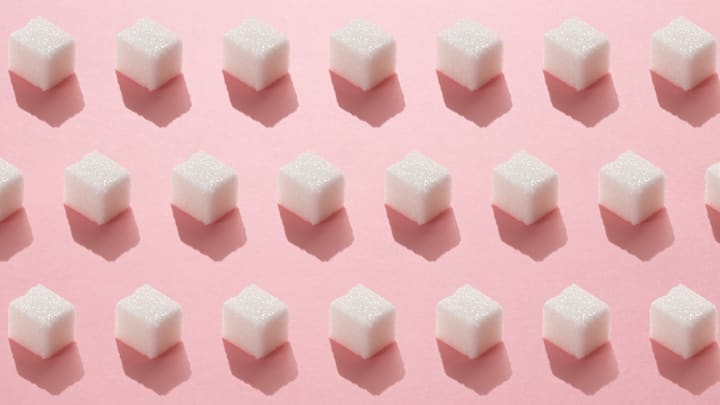When it comes to health problems and nutritional controversy, the finger of blame is most often squarely pointed at one culprit: sugar.
The consumption of the sweet-tasting carbohydrate is a hotly debated topic, and the misconceptions sometimes outweigh the truth. Don’t fear, however, because Mental Floss and Cheribundi are here to clear up the confusion surrounding sugar. Here’s the truth about five of the most common misconceptions about sugar.
Misconception #1: You should avoid fruits because of the sugar content.
Fruits are nutrient-dense snacks that are vital to the human body. Fruits are also full of vitamins, minerals, antioxidants, and fiber. They do contain natural sugars, such as fructose, which—when consumed along with the other nutrients in fruit—break down more slowly in your body than refined carbs do. Fruits like apples, berries, oranges, peaches, and tart cherries are also far healthier and contain fewer calories than processed snacks or those sweetened with added sugar.
The official Dietary Guidelines for Americans recommends consuming a minimum of 1.5 to 2 cups of fruit daily. Eating fruits and vegetables is known to have positive effects on health outcomes, including cardiovascular disease, some cancers, type 2 diabetes, and obesity. Whether you consume your fruits fresh or frozen, in smoothies, or as 100 percent juices, as long as there are no added sugars, eating fruit means fueling your body the right way.
Misconception #2: Artificial sweeteners are the same as naturally occurring sugars.
Natural sugars are found in whole foods such as fruits and vegetables. Artificial sweeteners, on the other hand, are developed in labs with the goal of providing the sweetness of sugar without the calories. Artificially sweetened foods usually don’t contain the vitamins, minerals, and fiber you’d get from whole fruits and veggies.
Artificial sugars have been controversial, with consumption of some types of these sweeteners having been linked to chronic diarrhea and disrupted metabolism. The overconsumption of added sugar or fake sweeteners can lead to long-term health problems. To avoid this, choose foods and beverages without added sweeteners of any kind.
Misconception #3: We’re better off eliminating all sugar from our diets.
Our bodies need sugar. The danger to our health and wellbeing is found in consuming too much sugar.
The carbohydrates from the food we eat turn into glucose in our bodies. Our cells then pull that glucose from the bloodstream and use it as a source of fuel and energy. If we were to remove all sugars from our diets, our bodies would go into “starvation mode,” forcing our bodies to work harder to find alternative sources of energy—which could ultimately affect brain function. A lack of glucose in the body can also cause headaches, fatigue, and brain fog.
Misconception #4: Consuming sugar is detrimental to your fitness regimen.
Many people believe that the consumption of sugar before, during, or after a workout is a no-no. But eating carbs may actually enhance body composition and exercise performance if consumed at particular intervals before or after physical activity. Though further research into this effect is needed, some athletes suggest it can also help repair damaged tissue and restore your energy reserves.
While sugary foods shouldn’t make up the bulk of your diet for many reasons, including an increased risk of developing type 2 diabetes or potential heart issues, enjoying them in small amounts gives us something to look forward to. And eating sweet snacks can even be beneficial. Your body needs carbohydrates, which are converted to glucose, to fuel your workout, maximize your performance, and help you recover from your workout faster. The consumption of complex and simple sugars, in their many forms, is a great way to do this.
Misconception #5: Blood sugar spikes are only caused by sugar.
When making lifestyle and health choices, we often focus solely on food. We avoid refined and added sugars and check the vitamin, mineral, fiber, and protein content of our food choices to balance our blood sugar levels and stay healthy.
Some people are quick to blame sugar for their blood sugar spikes, but there’s much more to the story: activity levels, stress, and illness can also affect blood glucose levels. There are a few other culprits as well.
When it comes to sugar, the debate about artificial sweeteners is still raging, with some studies showing they can raise blood sugar levels. Caffeine in food and skipping meals can also have a negative effect on blood sugar. Surprisingly, sunburn, dehydration, gum disease, smoking, and a lack of sleep may also make it harder to keep blood sugar levels stable.
Sugar is the body’s main source of energy—but you need to make sure you’re getting it from the right place first. Cheribundi harnesses the naturally occurring sugars found in tart cherries to provide your body with the energy it needs to optimize athletic performance. Not only will it give you a boost during a workout, but you’ll also benefit from extra fuel to help your muscles recover afterward. These natural sugars work with the antioxidants and phytonutrients found in tart cherries, which studies have shown to cut down on post-workout soreness and inflammation. Cheribundi is an all-natural recovery agent that was established 20 years ago and is consumed by nearly 400 professional and collegiate sports teams in the U.S. today.
